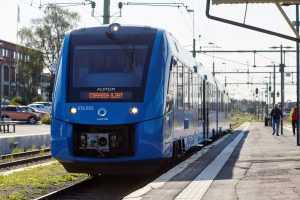 Alstom and MOL, Hungary’s leading oil and gas company, have signed a Memorandum of Understanding to explore the use of hydrogen technology in rail transport. Under the agreement, the two companies will work to decarbonise Hungary’s rail transport network.
Alstom and MOL, Hungary’s leading oil and gas company, have signed a Memorandum of Understanding to explore the use of hydrogen technology in rail transport. Under the agreement, the two companies will work to decarbonise Hungary’s rail transport network.
MOL Group produces and utilises almost 150,000 tonnes of hydrogen per year. Building on its business and technological competences, the company takes a key part in the initiative by supplying green alternative fuels.
Hungary aims to play a leading role in the transition to net zero. Therefore, as part of its National Hydrogen Strategy, the country has been investigating the feasibility of introducing hydrogen technology to rail transport.
“The MOL Group is committed to sustainable development and the company’s key strategic objective is to become carbon neutral by 2050. The time has come to produce hydrogen with lower carbon intensity in line with the regulatory environment and consumer expectations, and to also leverage our knowledge in the field of mobility” Gabriel Szabó, the Managing Director of MOL Group Downstream said.
The cooperation will analyse, search and implement the clean hydrogen as well as to explore its supply potential and related infrastructure which will boost the development of the sustainable transport relying on railways.
“With this MoU, we aim to share our experience in hydrogen technology and help Hungary to begin a new chapter in its rail transport: the era of net zero” Gaspar Balazs, the Managing Director and CEO of Alstom in Hungary said.
As outlined during the COP26 Summit in Glasgow, countries must accelerate their actions to limit global warming and keep it below the aimed 2 degrees. The EU’s 2030 climate ambitions remain unchanged – greenhouse gas emissions are to be reduced by 55% compared to 1990. By 2050, the European Union aims to achieve zero net emissions. Hydrogen trains, such as world’s first hydrogen train Coradia iLint manufactured by Alstom, are an emission-free alternative for non-electrified routes.
Hungary is a part of Alstom’s Central and Eastern Europe (CEE) cluster, the most diverse European cluster with 7000 people, an industrial presence in 9 countries and commercial activities in 8 countries.
Alstom has introduced the Coradia iLint hydrogen train to the German market in September 2018. The Coradia iLint trains have run over 200,000 km with zero CO2 emission in passenger service in Germany and Austria and has been successfully tested in the Netherlands. Alstom’s hydrogen technology has also been purchased by SNCF (France) and FNM (Italy).
Share on:



